Developer Offer
Try ImaginePro API with 50 Free Credits
Build and ship AI-powered visuals with Midjourney, Flux, and more — free credits refresh every month.
Meta AI Versus Copilot A Ten Prompt Showdown
AI assistants are becoming increasingly common, but choosing the best one for your specific needs can be challenging. To provide clarity, I conducted a test comparing Meta AI and Microsoft Copilot using 10 distinct prompts. These prompts covered a range of tasks, including email composition, explaining complex concepts, language translation, and image generation.
My focus was not solely on speed but also on the quality, practicality, and ease of use of the responses in real-world scenarios. Whether you're managing work projects, school assignments, or simply exploring new technology, this comparison aims to highlight the strengths of each tool and help you decide which AI assistant might be your ideal choice. Let's dive into the comparison and see which AI comes out ahead.
Key Discoveries
- Meta AI generally provided more comprehensive and context-aware responses for tasks like summaries, health advice, and recommendations, excelling in most everyday prompts compared to Copilot.
- For creative explanations and simplifying complex topics, such as explaining blockchain to a child, Meta AI's use of storytelling and analogies was more effective.
- Meta AI's suggestions for apps and products included more practical details, making its recommendations more actionable.
- Microsoft Copilot excelled in drafting professional and polite emails, offering warmer and more natural responses suitable for work-related communication.
- Meta AI was quicker and more intuitive for social media tasks like generating Instagram captions. Copilot’s captions were sometimes more creative but less direct.
- Both AIs encountered issues with the image generation prompt. Meta AI’s image was visually more appealing but included a watermark, while Microsoft Copilot missed some creative details. This category was a tie.
- The choice between Meta AI and Copilot hinges on individual priorities, focusing on aspects like creativity, speed, depth, and productivity.
- Overall, Meta AI emerged as the stronger everyday assistant in this test, particularly for quick, practical, and creative tasks. Microsoft Copilot remains a reliable option for productivity and formal communication.
Testing Criteria for Meta AI vs Microsoft Copilot
For this comparison, I utilized Meta AI via its web chat interface and within Meta's integrated apps like Facebook and Instagram. Microsoft Copilot was tested through its web version and within Microsoft 365 applications such as Word and Excel, given its design for close integration with these tools.
Both AI systems were given the exact same 10 prompts. These prompts encompassed creative writing, quick translations, productivity-oriented tasks, and image generation, with a mix of simple and more complex requests to evaluate their handling of different difficulty levels.
For each prompt, I assessed the results based on five criteria: speed, accuracy, depth, creativity, and image quality (where applicable). I also noted any watermarks on images, as Meta AI currently adds a visible watermark to all its generated images, while Copilot's watermarking practices can vary. The objective was to determine which AI offers a superior all-around experience for typical users of AI tools.
This methodology allowed for an evaluation not just of speed or accuracy, but of which AI integrates more effectively into daily life and provides immediately usable results.
The 10 Prompts Used for Testing Meta AI and Microsoft Copilot
Here are the 10 prompts I used:
Join 30,000 other smart people like you
Get our fun 5-minute roundup of happenings in African and global tech, directly in your inbox every weekday, hours before everyone else.
- Summarize the central theme of the 2025 World Environment Day campaign.
- Write a friendly email inviting a colleague to a lunch catch-up.
- Explain blockchain to me like I’m a 7-year-old in two paragraphs.
- Suggest three low-sugar snack ideas for people with high blood pressure.
- Translate “Congratulations on your promotion!” to French and German.
- Tell me about the top 5 free mobile apps for daily meditation.
- Generate a witty Instagram caption for a rainy-day selfie.
- Write a polite message declining a meeting due to a scheduling conflict.
- Summarize the plot of Chinua Achebe’s Things Fall Apart in five sentences.
- Create a photo of a Black artist with dreadlocks, wearing a paint-splattered denim jacket, passionately working on his latest masterpiece in a sunlit studio. The canvas should burst with vibrant colors, and the strokes should be full of movement and emotion. Sunlight filters through large windows, casting soft shadows on scattered paintbrushes and unfinished sketches, reflecting the beauty of the creative process.
Let’s examine the results.
Meta AI vs Microsoft Copilot: Performance in 2025
Prompt 1. Summarize the main theme of the 2025 World Environment Day campaign.
Results
Meta AI demonstrated strong performance from the outset, delivering a detailed summary that encompassed background information, the campaign's global significance, and even noted alternative themes circulating online before confirming the correct one. It appeared to genuinely understand the context beyond just keywords. Microsoft Copilot’s response was swift but seemed rushed and missed the deeper message. For this summary requiring more substance, Meta AI was the winner.
Meta AI’s Response
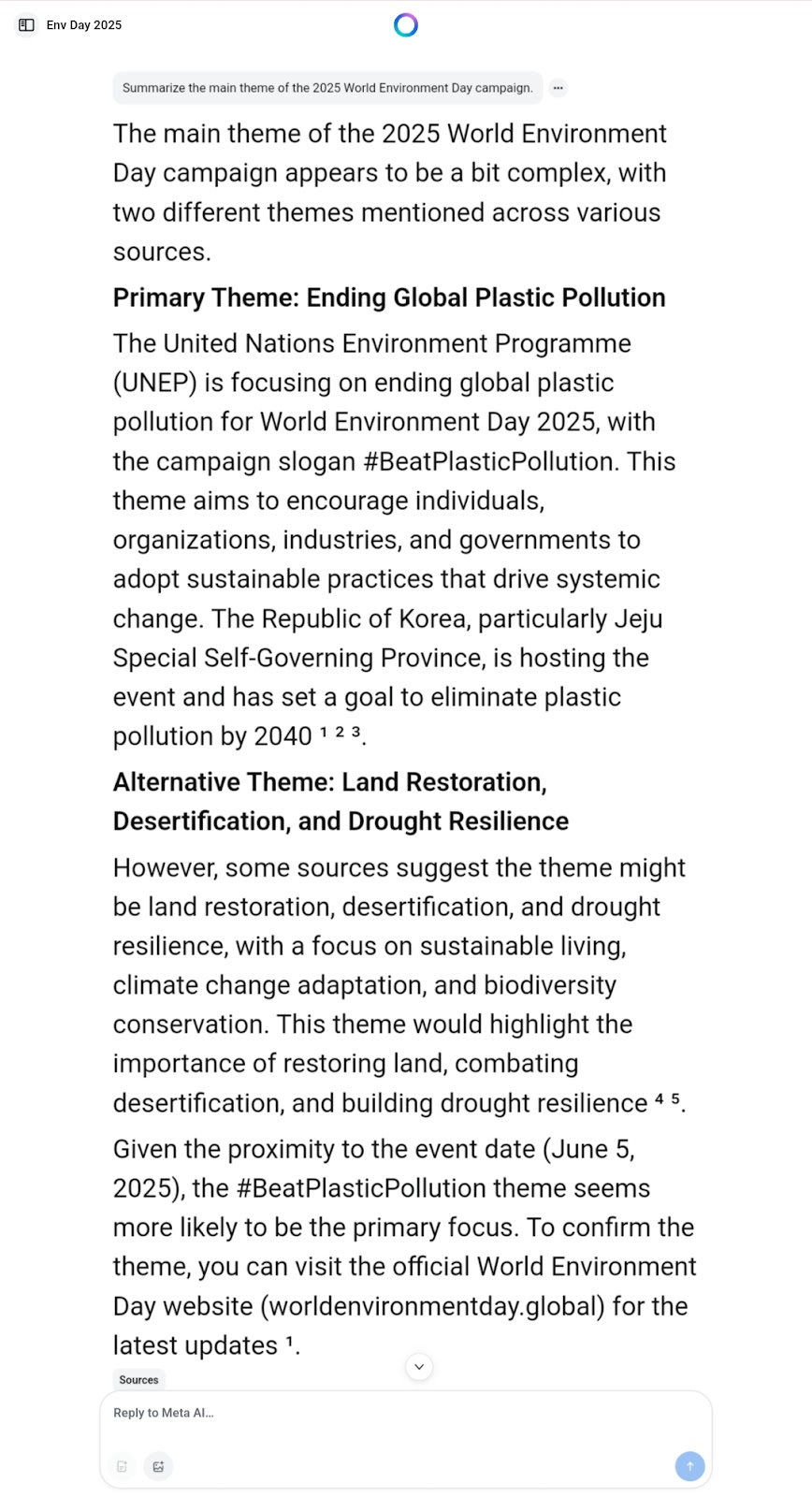
Microsoft Copilot’s Response
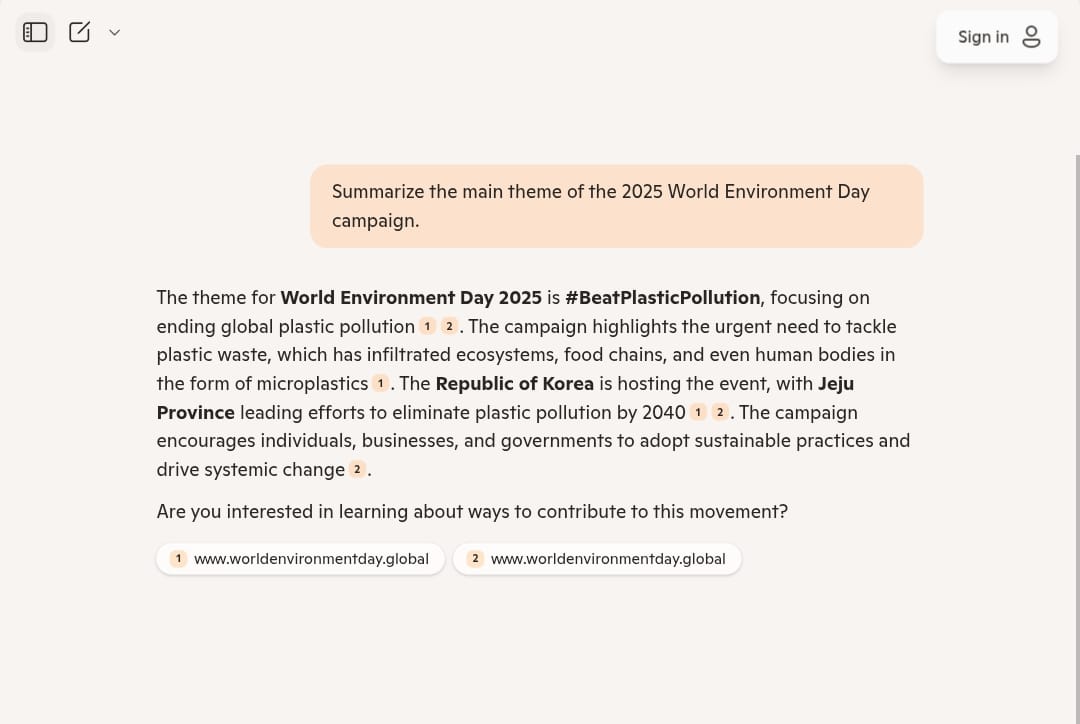
Prompt 2. Write a friendly email inviting a colleague to a lunch catch-up.
Results
This was one of the few prompts where Microsoft Copilot outperformed. Meta AI’s email was polite but very concise, almost template-like. Copilot’s message felt warmer and more personal, even suggesting a time and place—a touch that makes an invitation feel more genuine.
Meta AI’s Response
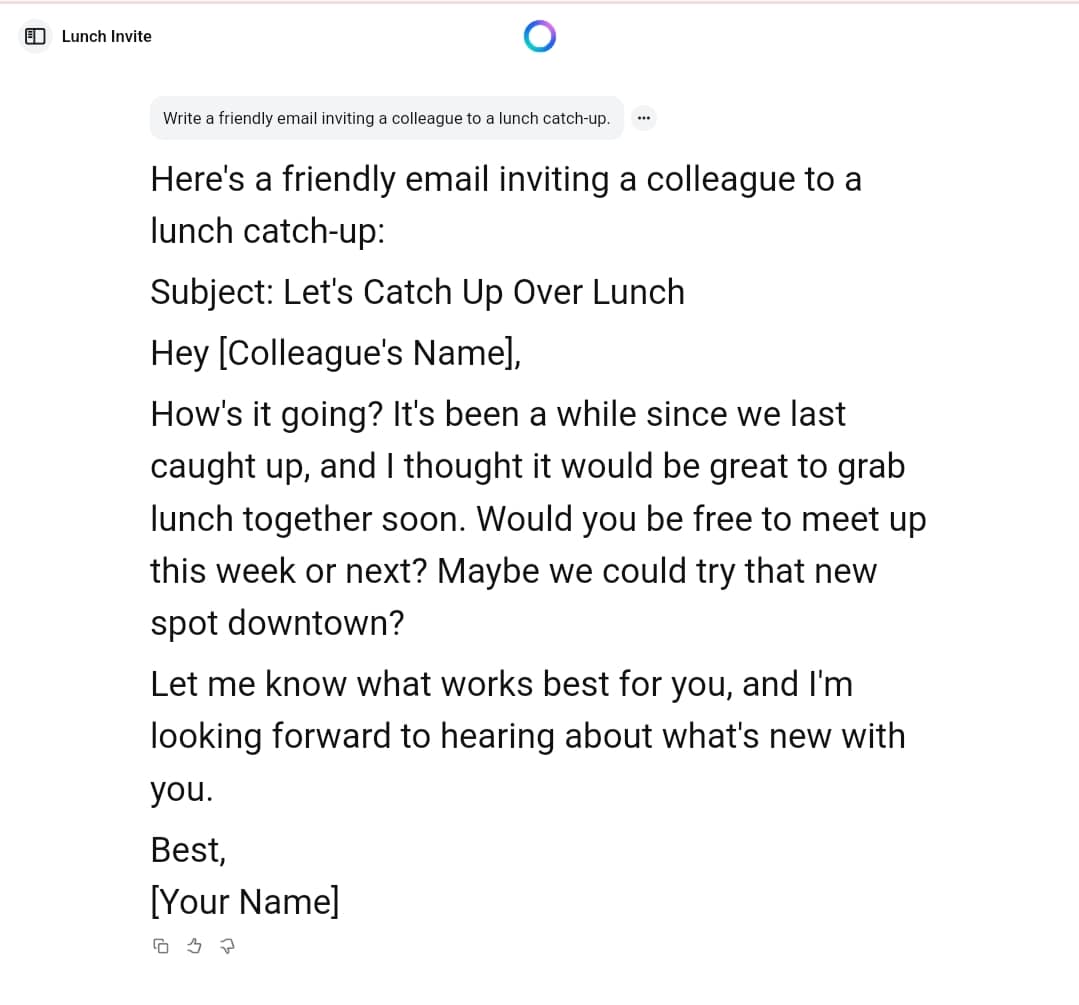
Microsoft Copilot’s Response
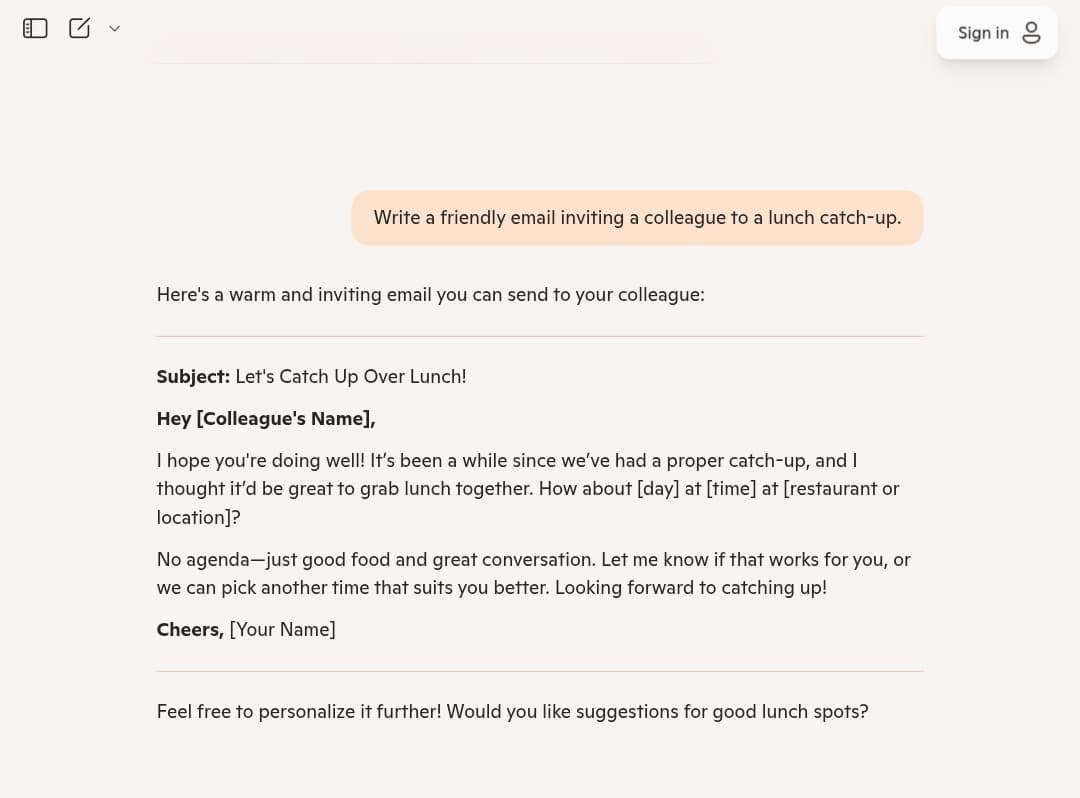
Prompt 3. Explain blockchain to me like I’m a 7-year-old.
Results
Meta AI excelled here. It employed simple analogies and a narrative style, making blockchain seem less daunting and somewhat enjoyable. Microsoft Copilot’s explanation was technically accurate but lacked the playful tone and relatability needed for a child (or even an adult!) to grasp it easily. For breaking down complex topics, Meta AI was more engaging.
Meta AI’s Response

Microsoft Copilot’s Response

Prompt 4. Suggest three low-sugar snack ideas for people with high blood pressure.
Results
In this instance, Meta AI did more than just list snacks. It provided context on why each snack was a healthy option, including extra details about their benefits. Microsoft Copilot’s answer was much briefer and offered little explanation. For individuals seeking practical, health-focused advice, Meta AI proved more beneficial.
Meta AI’s Response
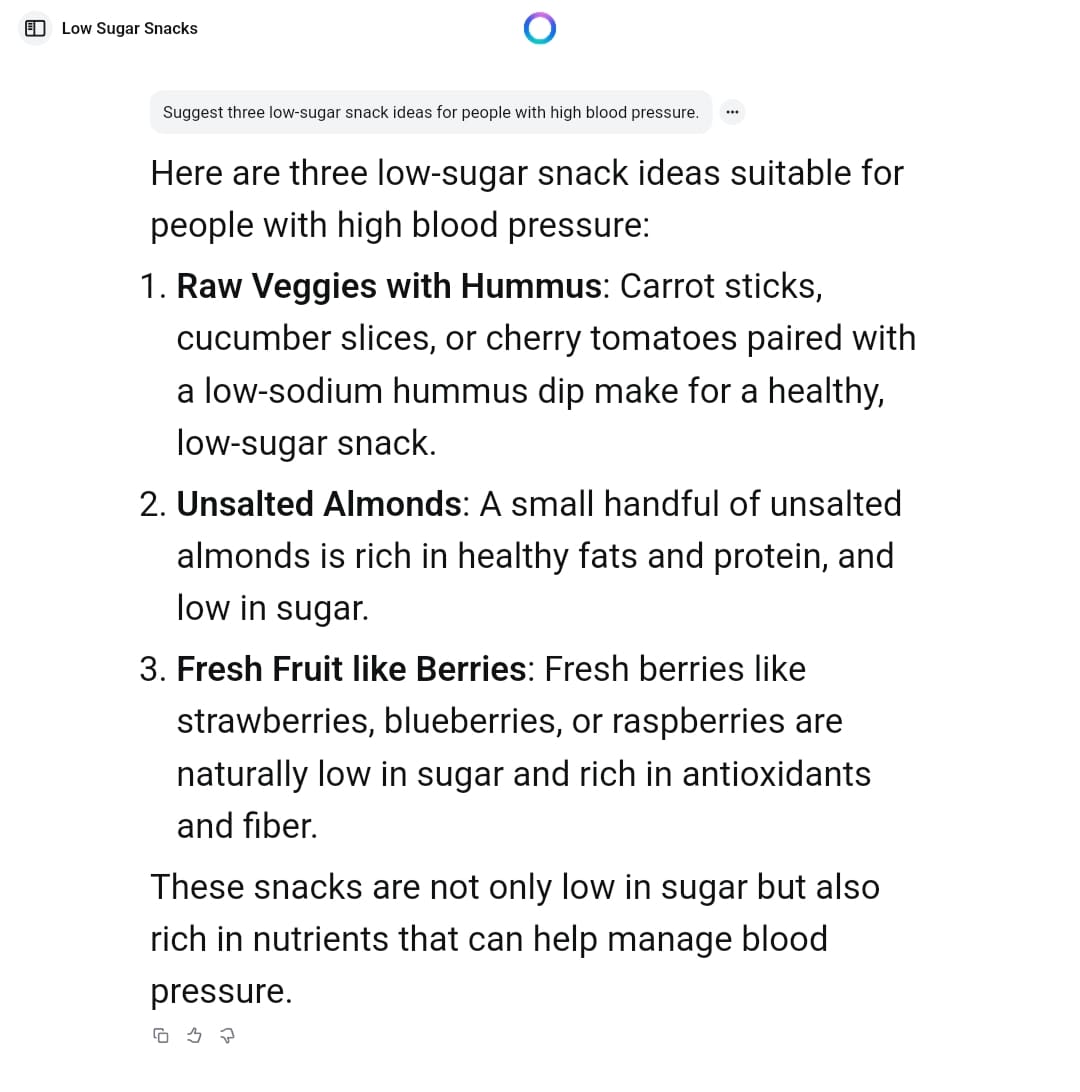
Microsoft Copilot’s Response
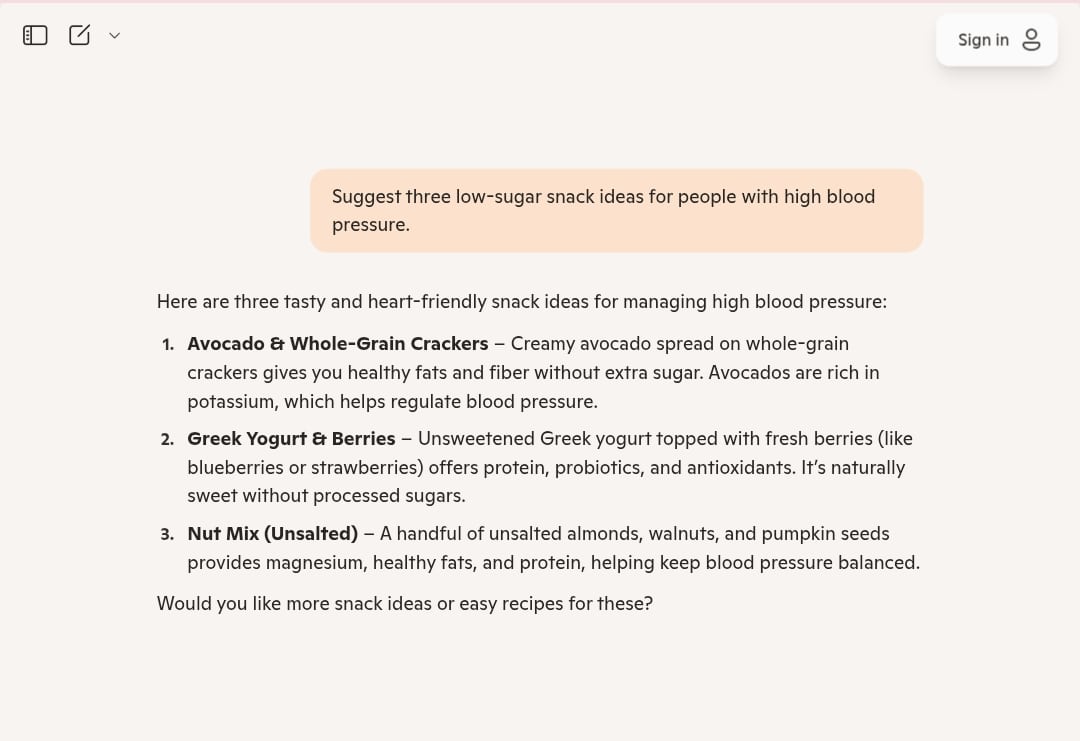
Prompt 5. Translate “Congratulations on your promotion!” to French and German.
Results
Both AIs provided correct translations. Neither included pronunciation aid or additional context, so this was a tie. They both fulfilled the request adequately, but no more.
Meta AI’s Response
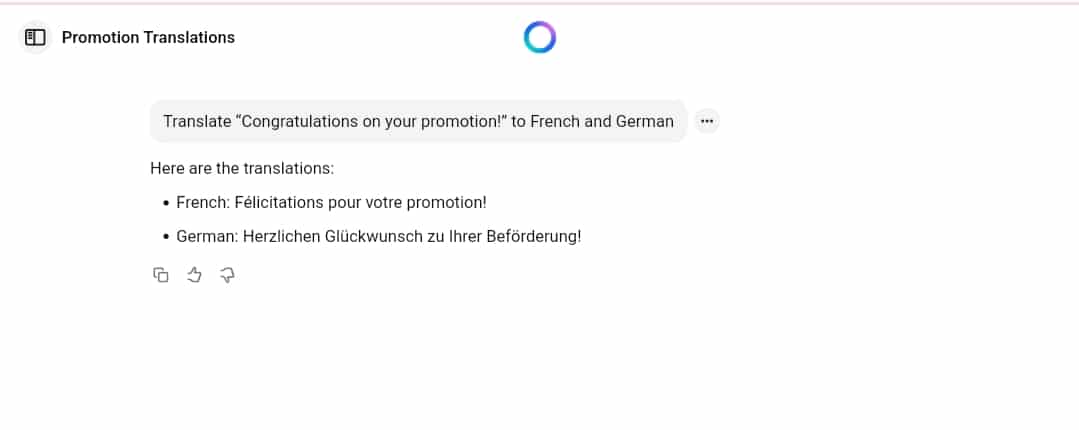
Microsoft Copilot’s Response
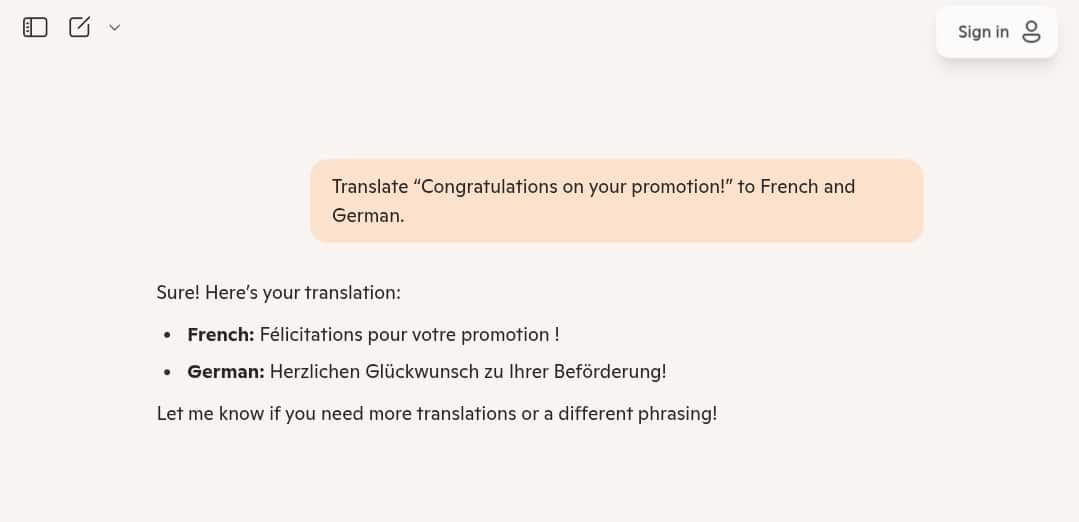
Prompt 6. Tell me about the top 5 free mobile apps for daily meditation.
Results
I observed that Meta AI provided a list with detailed descriptions, including each app’s features, target audience, and its pros and cons. Microsoft Copilot merely listed a few popular apps without elaborating, which was surprising given the prompt started with “Tell me about” and not “List.” Meta AI's recommendations would be more useful and assist a reader in making a quick choice.
Meta AI’s Response
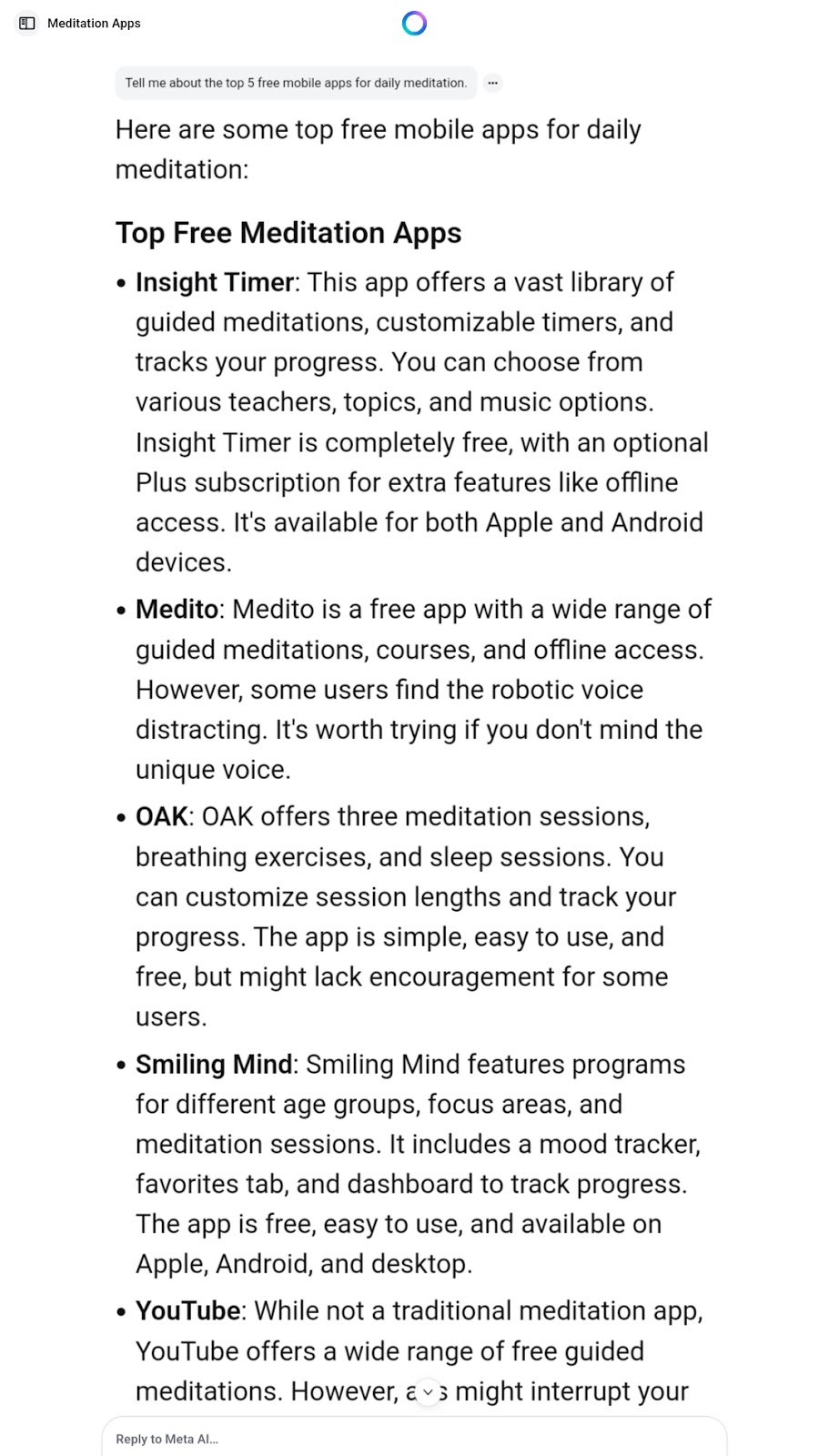
Microsoft Copilot’s Response
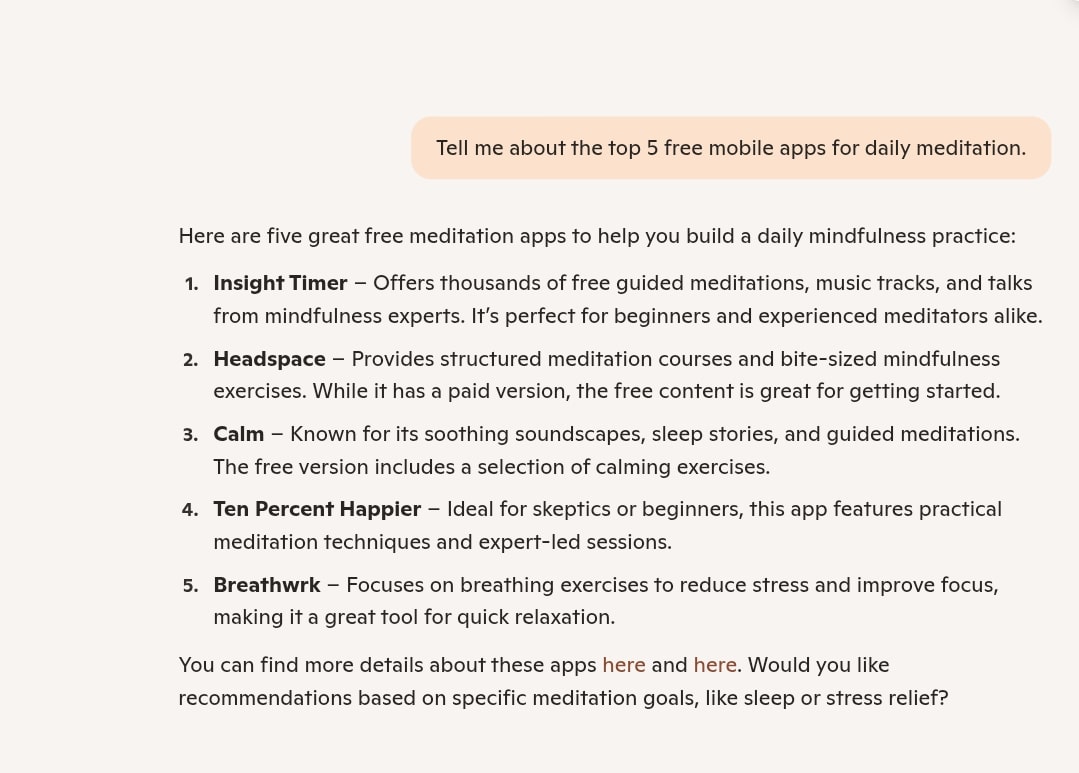
Prompt 7. Generate a witty Instagram caption for a rainy day selfie.
Results
Microsoft Copilot’s caption was more creative and punchy this time, whereas Meta AI’s was quick and fun but somewhat basic. If you're looking for something with a bit more flair for social media, Copilot had the edge.
Meta AI’s Response

Microsoft Copilot’s Response
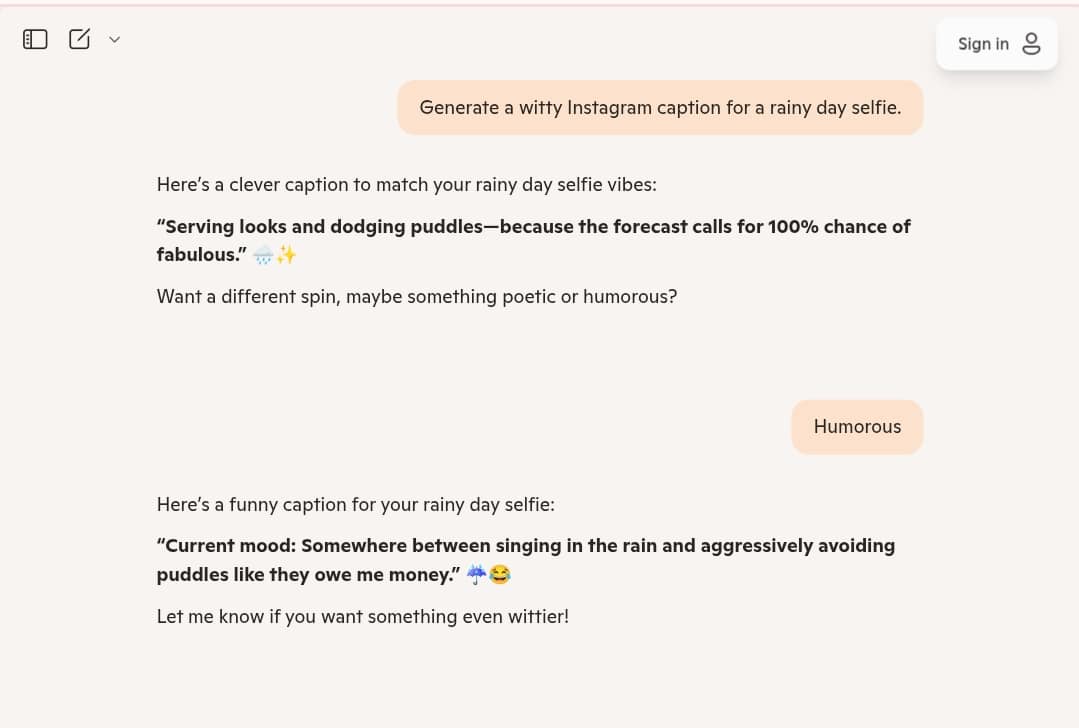
Prompt 8. Write a polite message declining a meeting due to a scheduling conflict.
Results
Microsoft Copilot performed better here as well. Its message was polite and friendly, mentioned the name of the meeting and the conflicting date/time (which shows attention to detail), and even offered to reschedule. Although Meta AI also offered to reschedule, its response was precise and formal but felt a bit stiff, lacking a human touch.
Meta AI’s Response
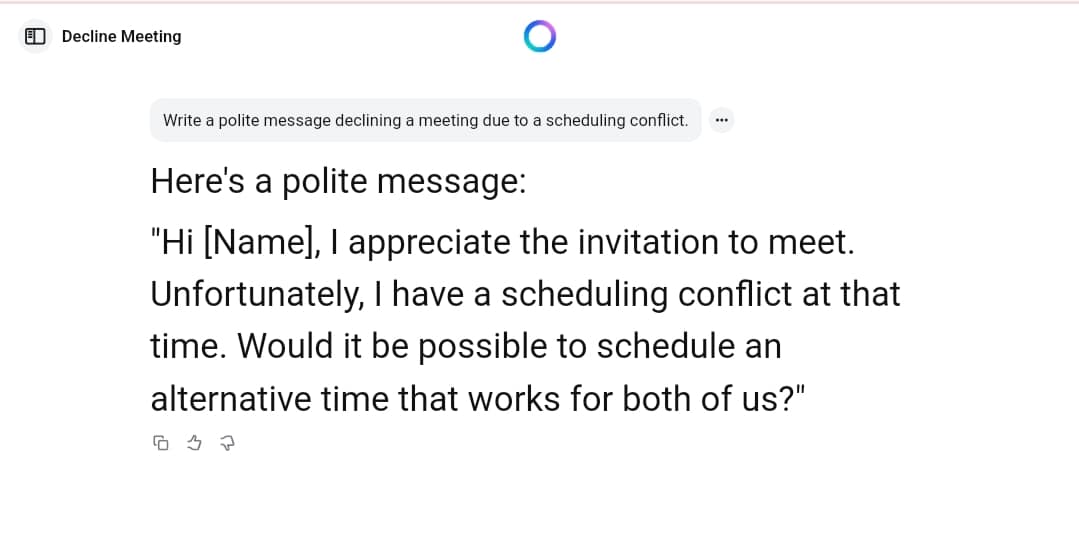
Microsoft Copilot’s Response
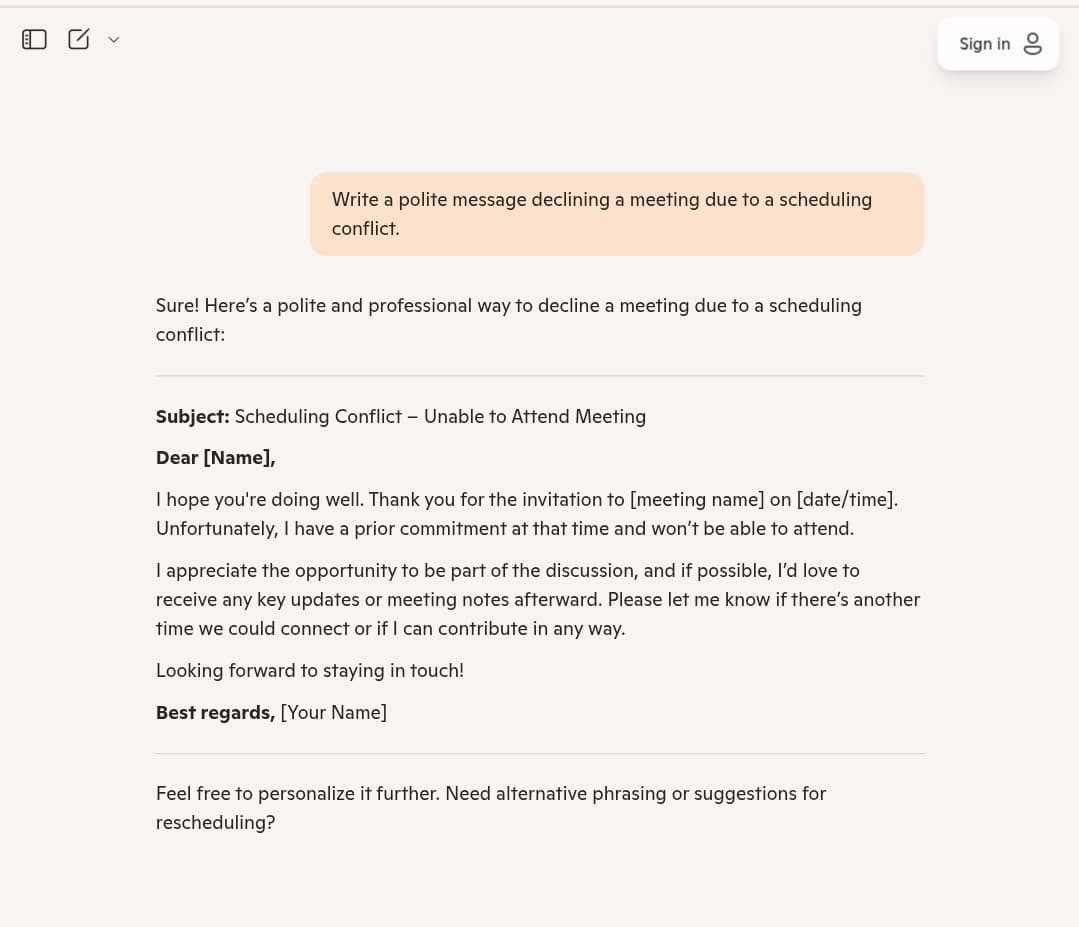
Prompt 9. Summarize the plot of Chinua Achebe’s Things Fall Apart in five sentences.
Results
Meta AI captured the main events and emotional tone of the story, making the summary feel complete. Microsoft Copilot’s version was brief and missed some of the nuances that make the novel so powerful. For literature summaries, Meta AI stood out.
Meta AI’s Response
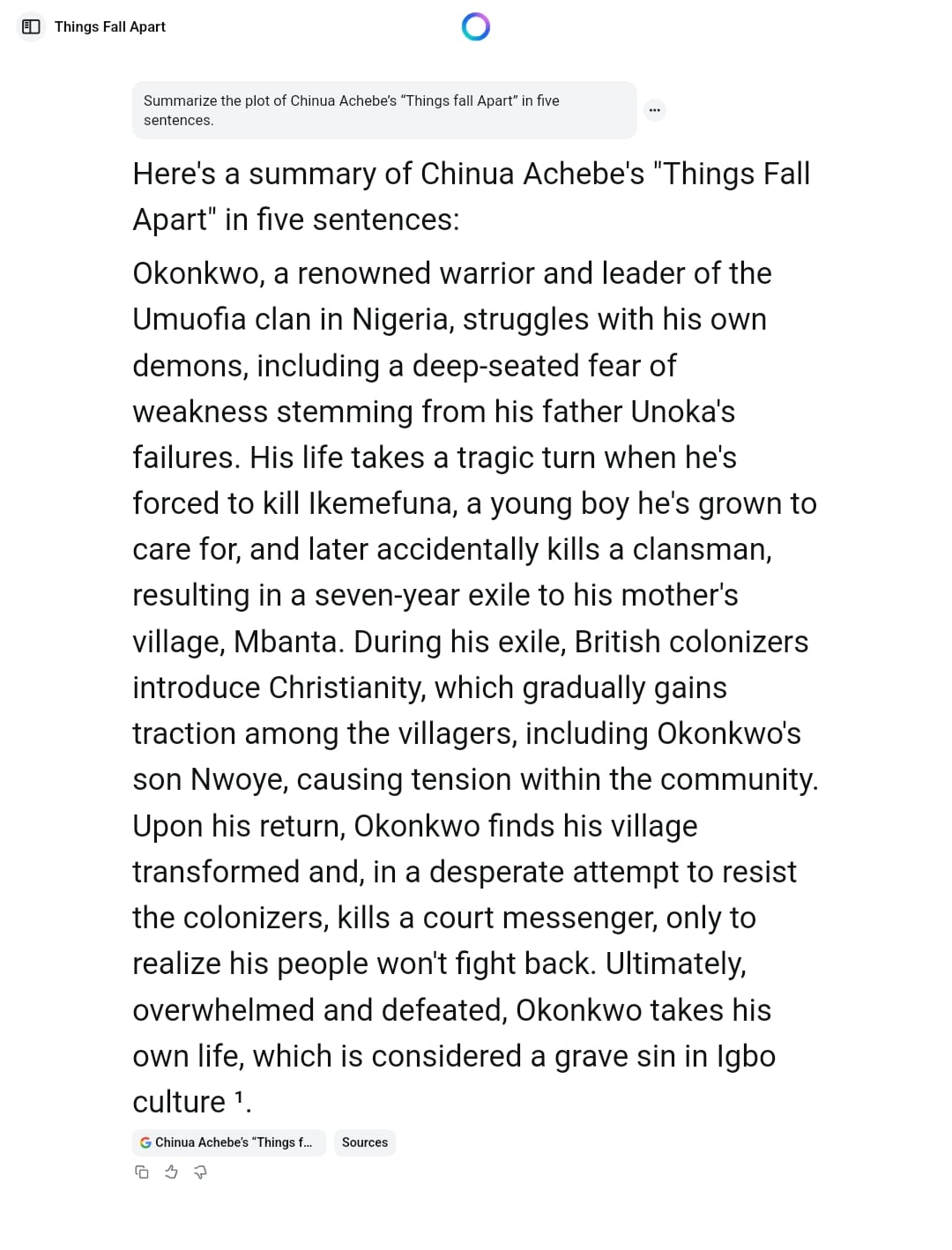
Microsoft Copilot’s Response
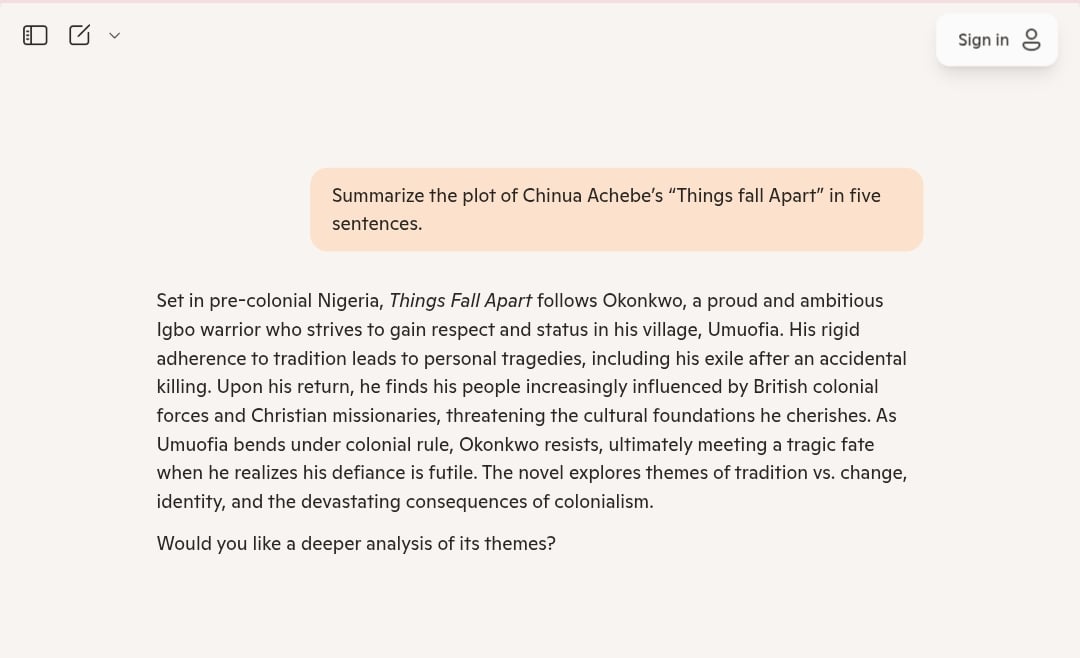
Prompt 10. Generate a photo of a Black artist with dreadlocks, wearing a paint-splattered denim jacket, passionately working on his latest masterpiece in a sunlit studio. The canvas should burst with vibrant colors, and the strokes should be full of movement and emotion. Sunlight filters through large windows, casting soft shadows on scattered paintbrushes and unfinished sketches, reflecting the beauty of the creative process.
Results
Meta AI produced a vivid, gripping image but missed some details: instead of a male artist, it depicted a woman, and there was no sign of scattered paintbrushes, though unfinished sketches were present. It also came with a visible watermark. Microsoft Copilot’s image was vibrant and showed paintbrushes (not scattered) and unfinished sketches but lacked emotional impact. However, it correctly depicted a Black male artist and had no watermark.
Meta AI’s Response

Microsoft Copilot’s Response

Meta AI vs Microsoft Copilot: Prompt-by-Prompt Comparison
| Prompt | Meta AI Observations | Microsoft Copilot Observations | Winner |
|---|---|---|---|
| 1. World Environment 2025 Day main theme summarization | Detailed summary with background info and global relevance. | Quick and concise but lacked depth. | Meta AI |
| 2. Friendly email invitation for lunch catch-up | Polite and brief. | Warm, personal, included suggested time and platform. | Copilot |
| 3. Explain blockchain like I’m a 7-year-old | Used simpler analogies and storytelling, very engaging and clear. | Simple explanation, somewhat dry and not very relatable. | Meta AI |
| 4. Low-sugar snack ideas for high blood pressure | Listed snacks with rich health context. Extensive. | Quick list. Included less health benefits. Brief. | Meta AI |
| 5. Translation to French and German | Accurate translations, but no pronunciation help. | Accurate with no pronunciation tips. | Tie |
| 6. Top meditation apps | Detailed descriptions, features, and “best for” notes. | Listed trendy apps without feature details. | Meta AI |
| 7. Witty Instagram caption | Quick, fun, and ready to use. | More creative but really punchy. | Copilot |
| 8. Email declining a meeting politely | Clear and formal but a bit stiff. | Polite, friendly, and offered to reschedule. | Copilot |
| 9. 5-sentence summary of Things Fall Apart | Captured key plot points and emotional tone. | Brief summary: missed some nuance. | Meta AI |
| 10. Create an emotionally drawn photo | Vivid, gripping, has a watermark, and is very appealing. Missed details. | Good image, vibrant and has no watermark. Missed details. | Tie |
Meta AI vs Microsoft Copilot Performance Summary
| Category | Meta AI | Microsoft Copilot | My Observations |
|---|---|---|---|
| Speed | 5⭐ | 4⭐ | Meta AI is faster for simple queries and images. Copilot takes longer but offers more detail. |
| Accuracy | 5⭐ | 4⭐ | Meta AI provides more accurate and context-aware answers. |
| Depth | 5⭐ | 3.5⭐ | Meta AI consistently delivers deeper, more thorough explanations. |
| Creativity | 4⭐ | 4⭐ | Meta AI leads in image creativity; Copilot excels in text creativity. |
| Image Quality | 5⭐ | 3.5⭐ | Meta AI’s images are vibrant; Copilot’s images are less consistent. (Meta AI images have watermarks) |
| Integration | 4⭐ | 5⭐ | Copilot’s Microsoft 365 integration is a significant productivity plus. |
| Usability | 5⭐ | 4⭐ | Meta AI is easy and fast for casual use; Copilot is better for work and research. |
When Should You Use Each AI?
After extensive use of both Meta AI and Microsoft Copilot, it's clear that the optimal choice depends on your specific task. If you frequently share quick updates, create engaging social media content, or need rapid answers to simple questions, Meta AI can be an invaluable tool. It is designed for speed and simplicity, delivering results in seconds for tasks like crafting a witty Instagram caption or generating a colorful image for a Facebook post. I found it particularly effective for brainstorming and when I needed quick results without requiring in-depth analysis.
A notable consideration with Meta AI is that all AI-generated images include a watermark. Meta has been transparent about this policy. If you intend to use these images for purposes beyond casual posting, such as presentations, blogs, or design projects, the watermark can be a significant drawback. There were instances where I admired the image Meta AI created, but the watermark necessitated extra editing or switching to an alternative tool.
Conversely, if your needs extend beyond quick content creation—for instance, drafting important emails, working on academic projects, or seeking to understand complex subjects—Microsoft Copilot truly shines. Copilot functions like a knowledgeable assistant, ready to provide detailed answers, simplify complicated topics, or guide you through tasks step-by-step. Its seamless integration with Microsoft Office makes it a natural choice for users already embedded in the Word, Excel, or Outlook ecosystem. I found Copilot especially useful for work, research, and any task requiring more thoroughness and structure.
My Verdict: Meta AI vs Microsoft Copilot - Who Wins?
After subjecting both Meta AI and Microsoft Copilot to my 10-prompt test, Meta AI surprisingly emerged as the top choice for my needs. What distinguished Meta AI was its speed and proficiency in handling creative and social-media-focused tasks. When I required a witty Instagram caption, a casual email, or a vibrant AI-generated image, Meta AI provided results that were fresh, relevant, and immediately usable. Its responses were concise and to the point. For image generation, the detail and color vibrancy were superior—even with the watermark, the images felt more alive and aligned more closely (though not perfectly) with my prompts.
Copilot, while robust, is particularly strong for longer, more technical answers or professional emails. It is an excellent tool for individuals who primarily use Microsoft 365 applications or require detailed explanations for work or study. However, during my tests, Copilot sometimes failed to meet the prompt's requirements adequately, providing answers lacking depth. Two prominent examples were prompts 6 and 9. In prompt 6, Copilot merely listed the five meditation apps without any details—just a plain list. In prompt 9, it missed crucial details when summarizing the plot of Achebe’s Things Fall Apart. Regarding image generation, Copilot’s result was acceptable but lacked the emotional resonance I sought.
This is not to say Copilot isn't useful; it is a solid option for productivity and technical writing. However, if you are seeking an AI that is fast, creative, and integrates naturally into your daily online activities, Meta AI is the winner for me. It is the tool I would prefer for accomplishing tasks quickly and with a touch of flair, especially for creative or social endeavors. Meta AI better suits my workflow and the types of prompts I frequently use.
Compare Plans & Pricing
Find the plan that matches your workload and unlock full access to ImaginePro.
| Plan | Price | Highlights |
|---|---|---|
| Standard | $8 / month |
|
| Premium | $20 / month |
|
Need custom terms? Talk to us to tailor credits, rate limits, or deployment options.
View All Pricing Details

